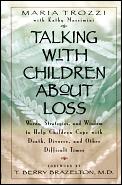I’m reading an interesting book called Talking with Children about loss, written by “Good Grief” counselor Maria Trozzi and co-authored by Kathy Massimini.

I’m always picking up books like those. I read Hope Edelman’s Motherless Daughters, for instance, when I was pregnant, and got many comments, mostly in the vein of “how can you read that now?”. But I am unashamed, because I’m a writer. It gives me the license to “imagine things” without having to be embarrassed about it. So, yes, I’ve imagined the worst for Amie: what if she died, what if I died, what if her father died? I’ve “lived” through these scenarios, and would like to, one day, write a novel about one of them and really explore such an event.
But I read these books first of all because, as any mother, I want to know what to do, or I want DH to know what to do, if Amie experiences a loss. I want to be prepared. Being a bookish person I naturally reach for texts, and find there my knowledge and my hope.
One of the first tasks of mourning, writes Trozzi, is understanding: understanding what death is. Not “going to sleep”, “passing away,” “going to heaven” or “being lost. Death is a physical process that ends everything that we call “human” that attaches to a person’s body. A child needs to understand that, and we need to stop using euphemisms. If a child doesn’t understand the most basic meaning of death, he or she will never be able to deal with loss, will never be able to mourn.
As I read that, I realized I had already started this task with Amie. For one, as I wrote earlier, I don’t want her to be ignorant of where her food comes from: that beef was a cow, that sausage was a pig, the wood in the hearth was a tree, etc.
But it has gone further. Many months ago Amie had repeated nightmares about a dinosaur. She woke up screaming and often would refuse to close her eyes again, because there was a dinosaur in the room, or it was coming. The way we helped her through this fearful time was by simply telling her that the dinosaurs are dead.
“What’s ‘dead’?”
“Dead means the dinosaur can’t move, can’t walk. Dead means he can’t talk, or listen, or look. Dead means his body is lying in the ground somewhere, buried, often even crushed to pieces. So he can’t get up and come here.”
She was quite resourceful. She said:
“But this dinosaur isn’t dead.”
“That’s not possible. All dinosaurs are dead. That’s why we call them a special word: ‘extinct’. ‘Extinct’ means that all the dinosaurs, without exception, are dead. So no dinosaur can come here.”
Sure, she was the only 2,5-year-old who knew the meaning of (and could pronounce) ‘extinct’. But hey, I believe in the power of words (and of their definitions, and of their correct application to the things in the world). And this was one clear-cut example of that power. Amie’s nightmares stopped.
My son has watched a dvd called the making of dinosaurs – how computer techs made them appear life like for a dvd series – and now he thinks certain people can bring animals back to life no matter what I say about dead meaning you dont come back to life, don’t move or breathe anymore – so he is still having lots of dinosaur dreams – we’ve resolved it a bit by teaching him how to escape from certain types of dinosaurs – that a lot of dinosaurs were vegetarians and won’t want to eat you etc – its tricky stuff!!!
Hi Gwyn,
o yes, it’s so tricky.
The “dinosaurs are dead” line and especially the simple and factual explanation of what “dead” means, seemed to work… at that stage for, possibly, that particular dinosaur (the one visiting her in her nightmares).
Amie has a very organized mind, and I hope she really got the “ALL” in “all dinosaurs are dead”. Still, at her age, kids’ imagination and their “magical thinking” are more dominant than their rational beliefs and could annul the latter at any given moment.
Your story is such a good example: you’d think your son would have “seen through” the images of dinosaurs as something artificial, but his magical thinking was stronger. Those techs were like magicians! Not something an adult would have anticipated.
The question then is to work through the scary belief all over again, with reasoning as well as emotional support. Something like: no matter how full of scary dinosaurs the world is, we’re here and will keep you safe from them. That, at least, is something we can promise them in all honesty.
Just like you did: I love your “some dinosaurs are vegetarians” approach! I think, in the face of the unstoppable onslaught of the imagination of certain very imaginary children, such “tricks” are all a parent has.
Then, how much to expose them to? For Amie, we try not to obsess. She’s seen Bambi for instance (though I wouldn’t have shown it to her had I watched it in advance). She was very impressed with the dreariness of it, but in the longer run I think it was good for her. She learned from it and now loves Bambi, having worked through her sadness.
What a roller-coaster parenting is!